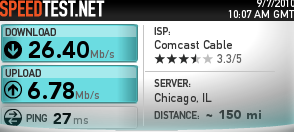Ok, I'll bite.
I've had DSL and Cable in many places, and my findings are that DSL can get you some packet loss under really high load (eg: torrents), but the normal uptime has always been extremely stable.
The advantage of DSL is that you have unbundled service in most countries (at least in the US and Belgium). Meaning, the company providing your physical line has to, by law, allow you to chose a different ISP. This is VERY important. Many people think they are stuck with something crappy like verizon, when in fact they can pick any ISP in the country offering dsl, including many good smaller ISP's.
When we lived in PA, we were with localisp (
http://localisp.com/) - the advantage being that most of these smaller isp's don't have the TOS from hell. Verizon's TOS for example, last I checked, does not allow you to run any type of server (including game servers) or use third party voip. Not that they actually apply this in practice, but they are bastards for it nontheless.
With localisp I had 100% uptime. I ran a monitoring server from my connection and received alerts+logs when something was down, and in the few years we lived there it never happened. They also offered a redundant line which could serve as a backup if one goes down, for relatively cheap (If i want the same from comcast here i'll be broke in an instant). The only times things became unstable (read: packet loss) is when the upload bandwidth was consumed 100%. I solved that using QoS.
DSL was a lot slower, but it sure was magnitudes more stable.
I've had cable in the US from RCN and now Comcast Bussiness, both randomly cut out. When it's up, the connection is stable. Unlike dsl, using 100% upload does not cause packet loss, however, one day you may wake up to find your internet not working at all, when you call them they claim to be working on something or other,... I've experienced downtimes of >3 hours in the middle of the day on a monday. Bad mojo when you're in the middle of work, and rely on a connection to do your job.
If I were given the option again, I'd pick the uptime stability over the speed.
Interestingly, when I was in Belgium, the same story was repeated. I had DSL (belgacom) there and cable (telenet). The DSL service had very stable uptime, though gets funky when you max things out (need a good QoS setup in your router). Cable is stable when up, but more overall downtime. - That leads me to believe the phenomenon is inherit in the technologies used.
I haven't tried FIOS yet, it would be interesting to see how it compares in uptime versus speed.
Also, with cable your speed will vary up and down depending on where you live and the time of the day. (Everything is 'shared' with your neighbors so to speak) - This can work to your advantage when you live in the middle of nowhere, or disadvantage when you're in the city ; while dsl lines are dedicated.

[edit]
PS: It's interesting to compare my speed and mouser's - same provider, same area, except he is more in the city than I am - (It's also a different plan, though not sure how much different)
[/edit]
